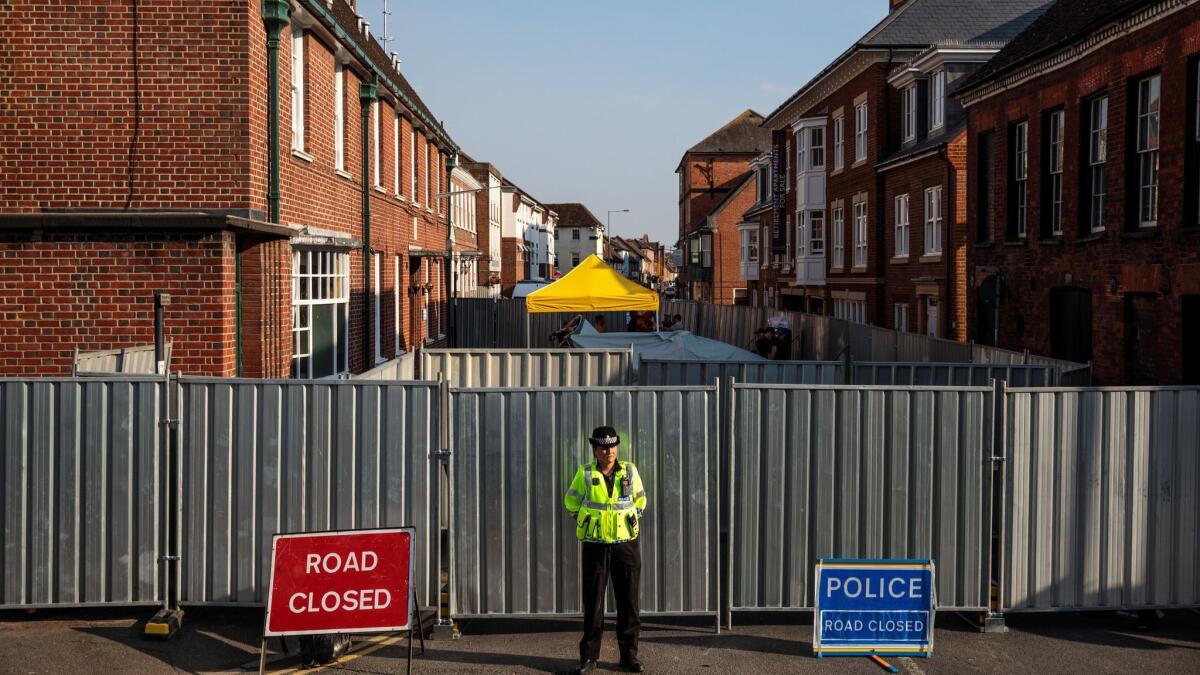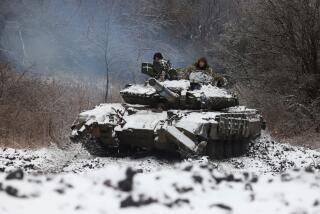U.K. official accuses Russia of dumping poison in Britain

- Share via
Reporting from London — Britain is being used as a “dumping ground for poison” by the Russian state, the Home secretary told Parliament on Thursday as he demanded to know how two British citizens became critically ill through exposure to the same deadly nerve agent that was used to target a former Russian double agent and his daughter.
Sajid Javid said it was time for Russian President Vladimir Putin’s government to explain “exactly what has gone on” after a man and a woman in their 40s were rushed to the hospital Saturday after becoming seriously ill in Amesbury, a town about eight miles north of the picturesque cathedral city of Salisbury where Sergei and Yulia Skripal were found slumped on a bench in March.
“It is completely unacceptable for our people to be either deliberate or accidental targets, or for our streets, our parks, our towns to be dumping grounds for poison,” he told lawmakers. Prime Minister Theresa May described the developments as “deeply disturbing.”
The couple, named locally as Charlie Rowley, 45, and Dawn Sturgess, 44, are believed to have handled a “contaminated item” that could have been used to carry the deadly nerve agent and had not been discarded properly, authorities said.
The United Kingdom’s chief medical officer Sally Davies said the risk to the wider public was low but warned against picking up any unknown or dangerous objects such as needles or syringes.
Anyone who spent time at any of the six sites that the pair visited from Friday evening to Saturday were also urged to wash their clothes and clean their shoes, cellphones and other personal possessions with wet wipes.
When the couple first became sick Saturday, Wiltshire police initially believed that they had been using a contaminated batch of heroin or crack cocaine.
But by Wednesday morning the police declared a “major incident” and later that day announced that the two had been exposed to Novichok, the same nerve agent that was used to target Sergei Skripal, a former Russian military intelligence officer who lived in England, and his daughter Yulia, who was visiting him. They were found slumped on a bench and spent months in a hospital.
Experts at the British defense facility Porton Down, which is coincidentally only a few miles outside both Salisbury and Amesbury, have analyzed the samples from this latest case, but Javid said it was too early to tell if they came from the same batch that poisoned the Skripals. The parallels, however, were clear.
“Obviously this incident will invoke memories of the reckless murder attempts of Sergei and Yulia Skripal earlier this year,” Javid said. “This is the leading line of inquiry.”
The Skripal case sparked a major diplomatic crisis between Britain and Russia, and relations plummeted to their worst since the Cold War.
Russia strenuously denied any involvement, but May told Parliament that it was “highly likely” that Moscow was behind the attack.
She issued an ultimatum to Putin’s government to offer an explanation for how the nerve agent ended up on British soil — had it happened deliberately? Or had Russia lost control of a deadly weapon? When Moscow did not respond, she expelled 23 diplomats. Numerous Western allies, including the United States, followed suit.
Hundreds of investigators worked around the clock on the Skripal case at the cost of several million dollars, scouring any site the pair had visited for clues, carefully destroying any contaminated items and ensuring there was no risk to the wider public’s health.
But now more than 100 detectives from the counter-terrorism network are once again sealing off key areas, donning hazmat suits and trying to determine how the Novichok nerve agent has harmed people on British soil once again.
Authorities said they do not believe that Rowley and Sturgess visited any of the sites that the Skripals spent time in, nor is there any evidence to suggest the British couple were deliberately targeted.
Until Thursday, all eyes were on Russia for an entirely different reason — the soccer World Cup, which has seen England’s team advance to the quarterfinals for the first time since 2006. The tournament has resulted in scenes of jubilation around Britain, and thousands of fans have traveled to Russia to cheer their team on.
On Thursday, Russian Foreign Ministry spokeswoman Maria Zakharova took aim at the British press, accusing it of a blatant anti-Russian campaign.
“We call on Theresa May’s government to put an end to the conspiracies with chemical agents and not to hamper the investigation into what happened to the Russian citizens in Britain,” Zakharova said.
Putin spokesman Dmitry Peskov also took aim at the British government, saying that Russia had repeatedly offered to take part in a joint investigation into the Skripal case, but that the offer was rejected.
“Unfortunately, these appeals have gone unanswered,” he said.
Aside from the World Cup, this renewed focus on the poisoning of Sergei and Yulia Skripal comes at an inopportune time for Russia.
Putin is preparing to have his first one-on-one meeting with President Trump on July 16 in Helsinki, Finland, a much-anticipated meeting that Russians hope will help steer the two nations toward improving relations that are at a historic low partly because of Russian meddling in the U.S. presidential election.
The focus on Russia also comes days before a North Atlantic Treaty Organization summit that will address the poor relations between Russia and the West.
On Thursday, the European Union announced it had extended its economic sanctions against Russia for another six months, saying Moscow had not fulfilled its obligations in the peace process in eastern Ukraine.
Special correspondents Boyle and Ayres reported from London and Moscow, respectively.
More to Read
Sign up for Essential California
The most important California stories and recommendations in your inbox every morning.
You may occasionally receive promotional content from the Los Angeles Times.














